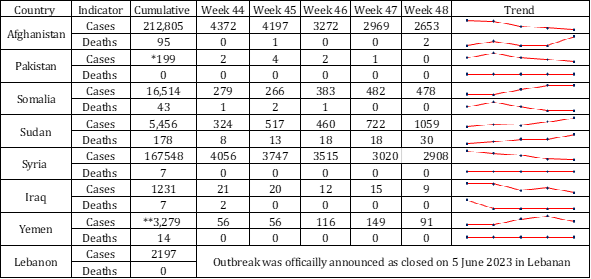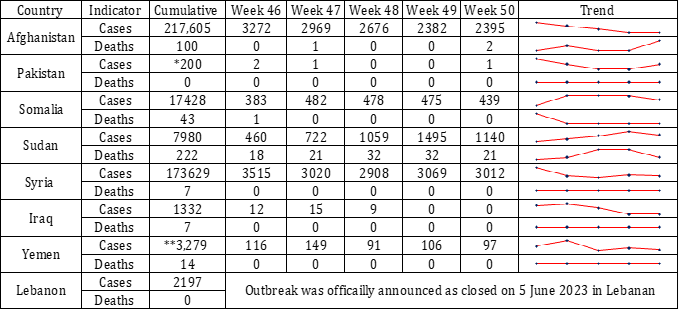Acute watery diarrhoea/cholera updates (02 December 2023)
In 2023 as of 2 December, globally, 29 countries reported AWD/cholera outbreaks. In the Eastern Mediterranean Region of WHO, nine countries, namely Afghanistan, Iraq, the Islamic Republic of Iran, Lebanon, Pakistan, Somalia, Sudan, Syria, and Yemen have reported acute watery diarrhea (AWD)/ suspected cholera cases during 2022. In 2023, 8 out of these 9 countries continued to report AWD/ suspected cholera cases; however, a cholera outbreak in Lebanon was officially announced as closed on 5 June 2023.
During the reporting period (epi week 47-48 2023), 14,556 new AWD/suspected cholera cases, including 50 associated deaths, were reported from 7 Member States (Table 1). During the period of 1 January to 30 November 2023, 409,330 AWD/suspected cholera cases, including 344 associated deaths, were reported from 8 Member States (Table 1).

Table 1: Number of cases, deaths and trend of AWD/suspected cholera cases reported from 8 member states in the EMR, January-November 2023
*Pakistan reports only laboratory-confirmed cases.
**Data from Northern Yemen were not received.
While males and females seem to be almost equally affected by AWD/ suspected cholera in the Region, most of the AWD/ suspected cholera cases in Afghanistan (57%), Both Somalia and Syria (54%) are children under five years of age. In Lebanon and Yemen, children under five years represent 26% and 24% of the total suspected cases respectively. There are many drivers contributing to the resurgence of cholera in the Region, such as climate change, conflict and political instability, weak health systems, increased population movement, poor water and sanitation infrastructure, and low awareness among the public. With the support of WHO and other partners, all cholera-affected countries implemented multisectoral cholera response interventions, including coordination, early warning surveillance, water, sanitation, and hygiene, laboratory diagnosis, clinical case management, risk communication and community engagement, and oral cholera vaccination.
Considering that many countries in the Region are facing natural disasters, political and economic instability, and armed conflicts, it’s critical to enhance the prevention, preparedness, and response capacities for AWD/cholera in the region. Therefore, the high-risk countries -with WHO support- need to work on strengthening coordination, and building capacities for early detection, diagnosis, and rapid response to AWD/cholera outbreaks, in addition to enhancing the capacity for risk communication and community engagement.
Subscribe to the monthly infectious hazard preparedness newsletter of WHO’s Health Emergencies Programme for the latest data and analysis on epidemic- and pandemic-prone diseases, as well as news on outbreak preparedness and response within WHO’s Eastern Mediterranean Region.
Acute watery diarrhoea/cholera updates (16 December 2023)
In 2023, as of 16 December, globally, 29 countries reported AWD/cholera outbreaks. In the Eastern Mediterranean Region of WHO, nine countries, namely, Afghanistan, Iraq, the Islamic Republic of Iran, Lebanon, Pakistan, Somalia, Sudan, Syria, and Yemen, have reported acute watery diarrhea (AWD)/ suspected cholera cases during 2022. In 2023, 8 out of these 9 countries continued to report AWD/ suspected cholera cases; however, a cholera outbreak in Lebanon was officially announced as closed on 5th June 2023.
During the reporting period (epi week 49–50, 2023), 6 member states reported 14,611 new AWD/suspected cholera cases, including 23 associated deaths (Table 1). In 2023, as of 16 December, 8 member states reported 423,650 AWD/suspected cholera cases, including 393 associated deaths (Table 1).

Table 1: Number of cases, deaths and trend of AWD/suspected cholera cases reported from 8 member states in the EMR, January-December 2023
*Pakistan reports only laboratory confirmed cases.
**Data from Northern Yemen were not received.
While males and females seem to be almost equally affected by AWD/ suspected cholera in the Region, most of the AWD/ suspected cholera cases in Afghanistan (57%), Both Somalia and Syria (54%) are children under five years of age. In Lebanon and Yemen, children under five years represent 26% and 24% of the total suspected cases respectively. There are many drivers contributing to the resurgence of cholera in the Region, such as climate change, conflict and political instability, weak health systems, increased population movement, poor water and sanitation infrastructure, and low awareness among the public. With the support of WHO and other partners, all cholera-affected countries implemented multisectoral cholera response interventions, including coordination, early warning surveillance, water, sanitation, and hygiene, laboratory diagnosis, clinical case management, risk communication and community engagement, and oral cholera vaccination.
Considering that many countries in the Region are facing natural disasters, political and economic instability, and armed conflicts, it’s critical to enhance the prevention, preparedness, and response capacities for AWD/cholera in the region. Therefore, the high-risk countries -with WHO support- need to work on strengthening coordination, building capacities for early detection, diagnosis, and rapid response to AWD/cholera outbreaks, in addition to enhancing the capacity for risk communication and community engagement.
Subscribe to the monthly infectious hazard preparedness newsletter of WHO’s Health Emergencies Programme for the latest data and analysis on epidemic- and pandemic-prone diseases, as well as news on outbreak preparedness and response within WHO’s Eastern Mediterranean Region.
Acute watery diarrhoea/cholera updates (31 December 2023)
In 2023 as of 31 December, globally, 29 countries reported AWD/cholera outbreaks. In the Eastern Mediterranean Region of WHO, 9 countries namely, Afghanistan, Iraq, the Islamic Republic of Iran, Lebanon, Pakistan, Somalia, Sudan, Syria, and Yemen have reported acute watery diarrhea (AWD)/ suspected cholera cases during 2022. In 2023, 8 out of these 9 countries continued to report AWD/ suspected cholera cases in 2023, however, a cholera outbreak in Lebanon was officially announced as closed on 5th June 2023.
During the reporting period (epi week 51-52 2023), 5 member states reported 12,313 new AWD/suspected cholera cases, including 25 associated deaths (Table 1). In 2023, as of 31 December, 8 member states reported 434,760 AWD/suspected cholera cases, including 415 associated deaths (Table1).

Table 1: Number of cases, deaths and trend of AWD/suspected cholera cases reported from 8 member states in the EMR, January-December 2023
*Pakistan reports only laboratory confirmed cases.
**Data from Northern Yemen were not received.
While males and females seem to be almost equally affected by AWD/ suspected cholera in the Region, most of the AWD/ suspected cholera cases in Afghanistan (57%), Both Somalia and Syria (54%) are children under five years of age. In Lebanon and Yemen, children under five years represent 26% and 24% of the total suspected cases respectively. There are many drivers contributing to the resurgence of cholera in the Region, such as climate change, conflict and political instability, weak health systems, increased population movement, poor water and sanitation infrastructure, and low awareness among the public. With the support of WHO and other partners, all cholera-affected countries implemented multisectoral cholera response interventions, including coordination, early warning surveillance, water, sanitation, and hygiene, laboratory diagnosis, clinical case management, risk communication and community engagement, and oral cholera vaccination.
Considering that many countries in the Region are facing natural disasters, political and economic instability, and armed conflicts, it’s critical to enhance the prevention, preparedness, and response capacities for AWD/cholera in the region. Therefore, the high-risk countries -with WHO support- need to work on strengthening coordination, building capacities for early detection, diagnosis, and rapid response to AWD/cholera outbreaks, in addition to enhancing the capacity for risk communication and community engagement.
Subscribe to the monthly infectious hazard preparedness newsletter of WHO’s Health Emergencies Programme for the latest data and analysis on epidemic- and pandemic-prone diseases, as well as news on outbreak preparedness and response within WHO’s Eastern Mediterranean Region.








